
by Morgan Saltz | Sep 16, 2020 | Feature, General, News, The Arts
San Francisco, CA. Based on the historical Haight Street of San Francisco with another volunteer center in Berkeley, Prisoners Literature Project has delivered packages of literary material to prisoners for over 30 years. Unfortunately, the outbreak of COVID-19 has hindered both the organization to provide books to inmates as well as the prisoner’s ability to participate. While still sending out hundreds of packages per month, that amount is nowhere near the previous volume Prisoners Literature Project (PLP) was able to distribute.
PLP relies solely on volunteers to package and mail specific books, however social distancing guidelines in response to the pandemic have prohibited the organization to continue their normal volunteer operations. Simon Carless, a volunteer and social media advocate for PLP, emphasizes the organization’s total reliance on volunteers and donations; “Nobody is being paid by the organization, so for us, it’s important that all the money we receive goes directly to helping prisoners.”
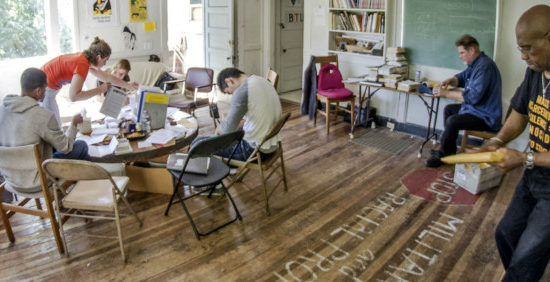
Volunteers such as those pictured are no longer able to gather and pack or distribute literature in The Grassroots House due to COVID. PLP hopes to return to their normal volunteer-based practice soon.
Partnerships with other nonprofit organizations further allow PLP to provide prisoners with a diverse collection of literature. Grassroots House is the parent organization to PLP, and Carless describes the nonprofit as a “collectively run physical space”. Grassroots activism allows increased diversity among both literature donations and volunteer demographics; “We do have a whole bunch of backgrounds, jobs, and ages, yes. I think everyone has a different view on why they are doing this and how they can help – so as a collective we try to self-organize so that everyone is doing what they want to do to make things better.”
PLP is also partnered with the Prisoner Activist Resource Center and includes the organization’s brochures within their literature packages to provide prisoners with information regarding resources and fundamental business knowledge. In addition to the education and resources prisoners receive through the PLP, Carless is proud of the more spiritual and therapeutic ameliorates their organization provides as well. “Many prisoners request dictionaries and thesauruses, so for them, their literacy is important….But in general, when they are in such isolation or have such poor access to reading materials, a great result is an improved state of mind and the feeling that somebody is looking out for them. We hope!”
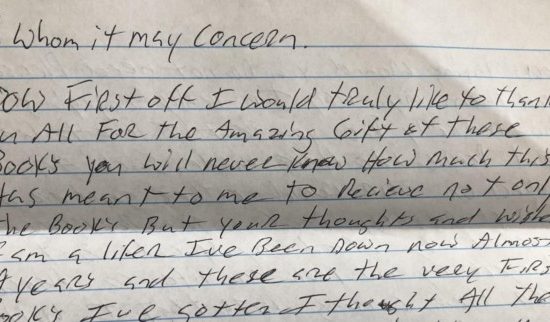
Carless highlights the organization’s appreciation for the letters of thanks PLP receives from prisoners due to their work.
While COVID has hindered their operation, Prisoners Literature Project continues to accept donations and hopes that both their dedicated volunteers as well as the prisoners who have had their resources restricted due to the pandemic can once again engage in the efforts of the organization. Carless acknowledges the immense impact of COVID on PLP; “Many prisons are in lockdown or partial lockdown and have been very badly affected by COVID, which is very sad. And PLP itself has had to stop doing group volunteer sessions, which has majorly affected our ability to send out packages. (We are still sending out hundreds per month, just not as many as we did.) We hope to get back to normal soon, but it’s difficult for everyone concerned.”
https://www.prisonlit.org/
From Prisoners Literature Project
The Prisoners Literature Project is an all-volunteer, non-profit group that sends free books directly to prisoners who request them from throughout the United States. Working almost continuously for thirty years, our U.S. prison books program has gotten (literally) tons of books into the American prison system, while staying overwhelmingly ‘grassroots’ – no full-time employees, no overhead eating up your donations.
Partnerships
Prisoner Activist Resource Center – https://www.prisonactivist.org/
The Grassroots House – https://grassrootshouse.org/
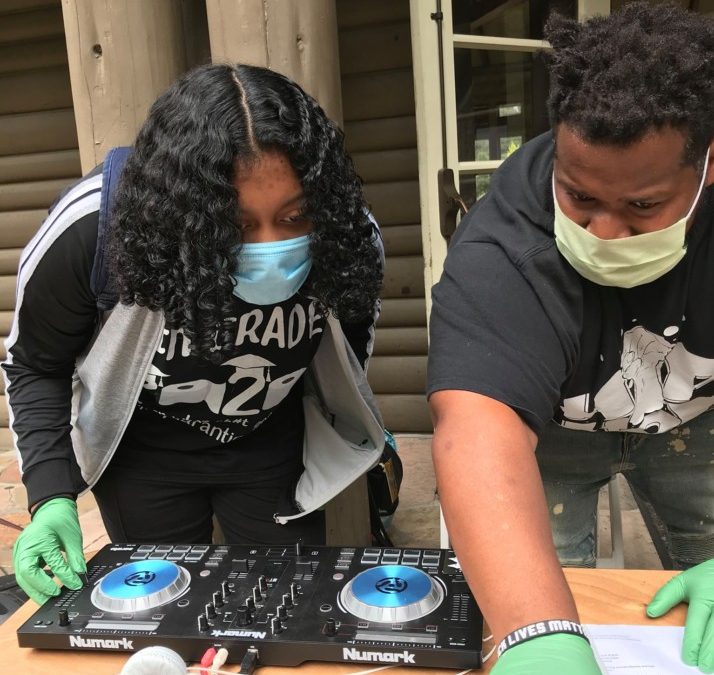
by Morgan Saltz | Aug 10, 2020 | Coming Up, General, News, The Arts
Oakland, CA. The beat goes on at Hip Hop for Change during the COVID-19 pandemic. Marlon Richardson, (above) is a Hip Hop educator who finds ways to continue working with marginalized youth and adults. While the historic Black Lives Matter (BLM) protests in the wake of George Floyd’s death are heightening awareness about racial and social injustice, artistic expression in the form of Hip Hop music has long been an outlet to critique unjust power relations. The emergence of Hip Hop culture in the 1980s impacted both social progress and individual growth. It was also the foundation for the nonprofit organization, Hip Hop for Change.
Founded in 2013, Hip Hop for Change offers programs to educate, support, and inspire both the youth and adults of Oakland. Executive Director Khafre Jay emphasizes the importance of working with urban youth who are dealing with discrimination and violence as a part of their everyday lives. Hip Hop for Change has implemented THE MC Program (Theory of Hip Hop Evolution, Music, and Culture) and has expanded the program to connect the youth to artist-educators who are trained to mentor and motivate young artists in the pursuit of their artistic aspirations. The program is not only for the youth; the artist-educators benefit from the training and employment provided by Hip Hop for Change. Khafre Jay emphasizes the impact of the program; “Since its inception, THE MC Program has touched the lives of over twenty thousand K-12 students, employed and trained dozens of local artist-educators, and half of our programming has provided for free to underserved youth. This program alone is one of the best reasons to support our organization’s work.” Not only the Executive Director for Hip Hop for Change but an established Oakland hip hop artist, the mission resonates personally for Khafre Jay; “Hip Hop is a very empowering culture. It provides an expressive space for youth of color as well as a constant pull towards self-affirmation, and ideas of self-esteem, and self-efficacy. For a lot of POC youth, the first time they find themselves experimenting with self-worth is through Hip Hop expression, and I was no different growing up.”
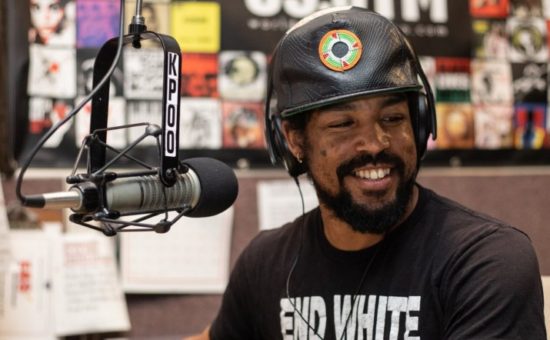
Executive Director Khafre Jay also holds a radio show on KPOO and is founded by Poor People’s Radio. The mission is to bring public news to the “disenfranchised and underserved”.
Grassroots activism has been intrinsic to Hip Hop for Change. Khafre Jay explains that “grassroots activism allows us not to have to code-switch as an organization.” He explains that a nonprofit such as his, which is Black-led and culturally focused, is not valued by the predominantly homogeneous decision-makers of white males that can provide funding. Therefore, receiving funding is difficult. However, Hip Hop for Change has had success through the Grassroots Jobs Program that not only spreads its mission statement to the community but provides employment, education, employee development, and connects their employees with community activism. As Khafre Jay explains; “Grassroots activism allows us to create hundreds of jobs and employ people in our village while engaging and informing the public about race and social justice. We couldn’t be as effective as Black and Brown people in this country without grassroots tactics.”

Employees for the Grassroots Jobs Program who are dedicated to fighting racial and social injustice
The Grassroots Jobs Program has suffered from the global pandemic as Hip Hop for Change was forced to furlough employees, and further setbacks came as school contracts ended due to COVID. Yet Hip Hop for Change continues to create ways to bolster their community. The organization is transitioning to online educational programs and creating new services such as free music production to youth under 25. In spite of the current global crisis, Hip Hop for Change is dedicated to social and racial activism, educating the youth on the history and significance of hip hop culture, providing resources for aspiring artists, and developing employment opportunities for the people of Oakland.
From HipHopForChange:
HipHopForChange seeks to address injustices of representation through education, community building, and the creation of a platform for people who identify with Hip Hop culture to express their true voices, selves, and culture. We create a space that emphasizes and encourages the root values of Hip Hop culture: peace, love, unity, and having fun.
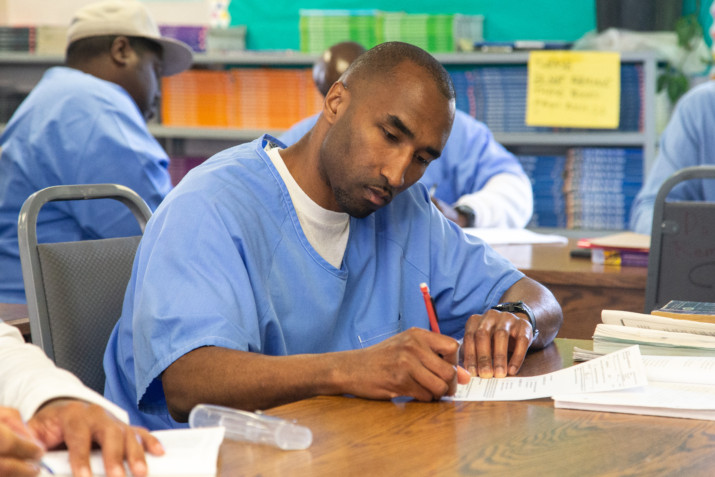
by Izzy Kowell | Aug 1, 2020 | Feature, General, News
San Quentin, CA. Prison populations across the U.S. have been hit hard by COVID-19. At San Quentin State Prison, the Prison University Project is trying to provide material and emotional support. The Prison University Project is a nonprofit working to expand access to higher education inside the California prison system. Due to COVID-19, all programming that is considered non-essential has been suspended, this includes the college classes offered by Prison University Project. However, the organization is taking on other projects to support the San Quentin prison community.
In recent weeks, the Prison University Project has coordinated the installation of mobile showers for corrections staff to help mitigate the possible spread of COVID-19.
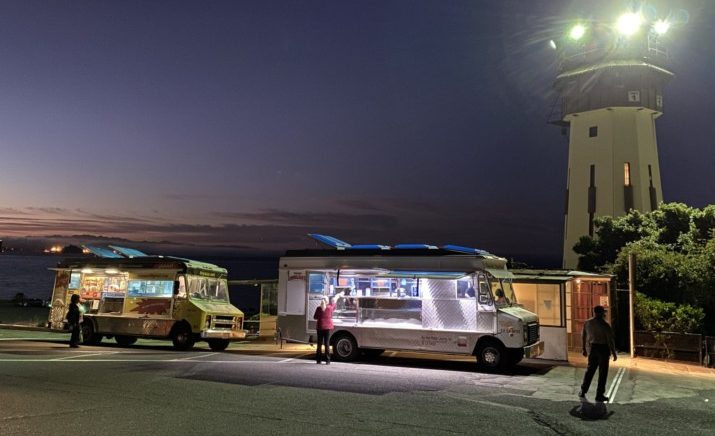
The Prison University Project also provides food trucks that allow staff to grab something to eat before or after their shifts.
Efforts to assist staff during the pandemic is just one of the initiatives the Prison University Project has taken on. The organization’s outreach notes, “Most notably, we coordinated the successful deliveries of care packages to the entire populations of San Quentin and Avenal State Prisons. […] San Quentin’s leadership has also allowed us to send magazines, textbooks, art supplies, hand-crank radios, and digital content (via closed-circuit television) to people on death row and other areas of the prison outside of the general population areas.”
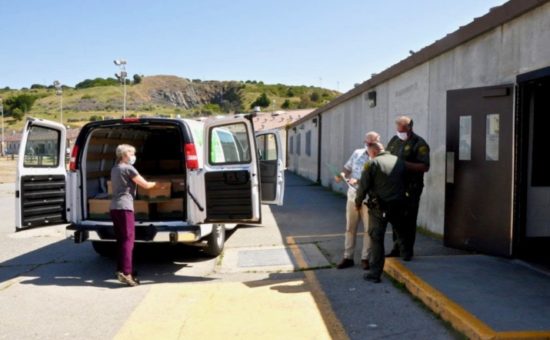
Prison University Project unloads care packages. (Photo credit, Lt. Sam Robinson)

Prison University Project student and Senior Editor of the San Quentin News, Juan Moreno Haines (pictured above) has emerged as a voice of the incarcerated during the COVID-19 crisis.
Juan Moreno Haines’ published pieces with information about what’s happening inside San Quentin during the COVID-19 pandemic can be seen at this link: https://theappeal.org/authors/juan-moreno-haines/
From the Prison University Project:
Here’s how to help incarcerated individuals at the moment. Increasing visibility of both formerly and currently incarcerated individuals by sharing and supporting their “advocacy efforts and publications widely” is one way in which people on the outside can help. Donations to the Prison University Project’s general operations and to its Covid-19 Care Package Initiative, both of which are linked here, are also useful. Additionally, donations to organizations such as Bonafide are appreciated. Bonafide helps individuals inside prepare for release and supports them when they leave the prison by providing essential supplies including cell phones and clothing.
The mission of the Prison University Project is to provide an intellectually rigorous, inclusive Associate of Arts degree program and College Preparatory Program, free of charge, to people at San Quentin State Prison; to expand access to quality higher education for incarcerated people; and to foster the values of equity, civic engagement, independence of thought, and freedom of expression.

by Izzy Kowell | Jul 26, 2020 | Feature, General, News
San Francisco, CA. During the COVID-19 pandemic, the Mission Education Projects Inc. (MEPI) is still trying to provide its usual academic support and enrichment activities. This nonprofit, based in the Mission district is pictured above. MEPI provides tutoring, homework help, and other educational activities to students and their families in the community. Although the organization was unable to host onsite programming after the shelter in place order began, the staff continued to communicate with students and families through methods including Facetime, phone calls, emails, and texts. MEPI also began group Zoom sessions with students focused on homework and tutoring.
Lana Alviar, the Program Director at MEPI, discribes the daily Zoom sessions as a time where, “everyone – students, parents and other family members (the toddlers from the family) along with staff get together” and can “chat, hang out, have dance battles, play games, and share our feelings and fears about COVID-19.”
The nonprofit has also adjusted its annual End of School Year celebration. This year the 2020 End of School Year celebration took place as a Zoom party. Lana describes the event: “Prior to the party students received a goody bag with party favors and snacks for the party. We acknowledged our graduates from Kindergarten, 5th grade, and 8th grade who each received a cap and tassel, a class of 2020 sash, and a 2020 graduation medal. Students, parents, guests, and staff all joined in to honor our graduates. Our celebration included presentations, songs, riddles, and goody bags and ended with everyone sharing what they were grateful for.”

Kindergarten grad books for the End of School Year Party.
For MEPI’s summer program, the students received arts and crafts kits which included everything needed to complete the projects. Lana notes how “These projects are educational, fun, and stress relieving.”
During the pandemic, Mission Education Projects Inc. is helping students and families with supplies as well. Lana reports how during one of their Zoom sessions she asked students what they needed and was “surprised by the simple request they had – they needed paper, pencils, crayons, markers – things they could use to make drawings or write stories on as well as make origami and paper airplanes.” With the help of some friends, Lana was able to gather the requested supplies and drop them off to the families. A picture of staff packing up the supplies is pictured below. “We were also able to get food boxes dropped off to the families which included fruits, vegetables, eggs, chicken, and pasta.”
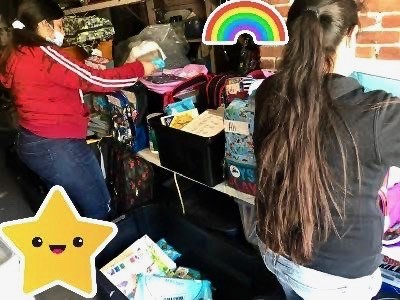
MEPI staff members pack supplies for kids and their families.
Lana speaks on how despite the difficulties COVID-19 has brought, the rewards of having a smaller program are shining through. All of MEPI’s Junior staff are former students themselves. “These students have grown up together and are very familiar with each other and with the staff” (Lana Alviar). Lana mentions how one of the best parts of the day is the end of day Zoom sessions with staff and students in which they’re able to check-in, talk about what they’re working on, and just hang out. “We have always been close with our students and their parents, but the COVID-19 pandemic has strengthened those relationships and brought us even closer and made us stronger as a group.”
From Mission Education Projects Inc:
If you’d like to support to Mission Education Projects Inc. the nonprofit could always use monetary donations. The nonprofits’ monetary donations have dwindled and MEPI is especially in need due to unexpected costs related to COVID-19.
“The mission of Mission Education Projects, Inc. is to provide at-risk youth & their families an equal opportunity to access a quality cultural sensitive & holistic educational and quality of the life experience involving every aspect of the child’s world of safe and empowering environment.”

















